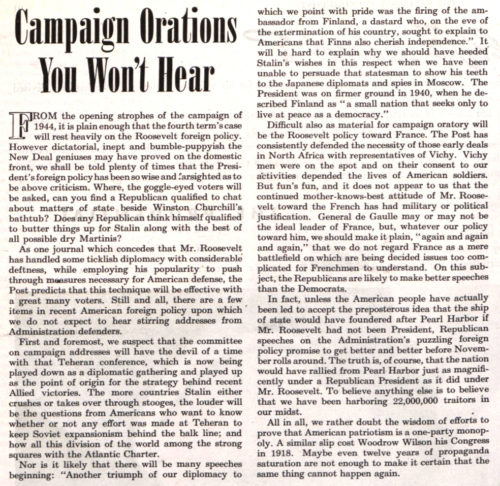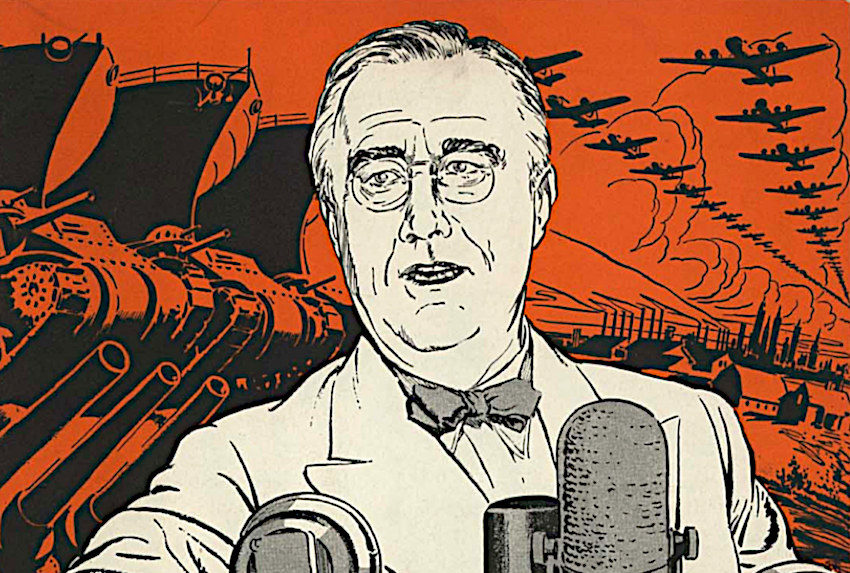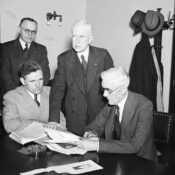“There are only three certainties in this world,” as the saying used to go, “death, taxes, and Roosevelt.” On July 11, 1944, Franklin Delano Roosevelt further solidified this idiom by becoming the first — and only — U.S. president to announce he would seek a fourth term in office.
In the midst of World War II, Roosevelt decided the country would be best be served with consistency in the executive branch. Unlike in 1940 when he did not openly campaign for re-election, and allowed himself to be drafted at the Democratic Convention, the President declared that he would seek an unprecedented fourth term in the 1944 election.
At the time, The Saturday Evening Post was skeptical of Roosevelt’s performance, calling the New Deal “dictatorial, inept and bumble-puppyish” and his foreign relations puzzling. In a July 22, 1944, editorial that appeared after Roosevelt made his announcement, the Post was particularly critical of Americans’ support of FDR’s foreign policy: “Where, the goggle-eyed voters will be asked, can you find a Republican qualified to chat about matters of state beside Winston Churchill’s bathtub?”

But the Post’s disfavor couldn’t stop the Roosevelt campaign. In selecting a vice president, Roosevelt favored his then VP, Henry A. Wallace, to continue on the ticket in 1944, but when the conservative members of his party objected to Wallace, Roosevelt leaned toward James Byrnes instead. When the more liberal wing of the party objected to Byrnes, Roosevelt chose the middle-of-the-road option, Missouri Senator Harry S. Truman.
Roosevelt would go on to win the presidency; however, he would not finish his term. He succumbed to cerebral hemorrhage in April of 1945, leaving the rest of his term, and the end of the Second World War, to President Truman.
On February 27, 1951, the states would ratify the 22nd Amendment, thereby enshrining in law that presidents could serve only two terms. The Amendment guaranteed Roosevelt’s legacy as the longest serving president in American history.
Featured image: The Life of Franklin D Roosevelt, Archives New Zealand r the Creative Commons Attribution-Share Alike 2.0 Generic license / Wikimedia Commons
Become a Saturday Evening Post member and enjoy unlimited access. Subscribe now




Comments
Thanks for the comment! It’s definitely interesting to see how some of the opinions have shifted over time.
Although I knew FDR was elected for a fourth term Tim, I didn’t know these facts and details behind it. He not only didn’t complete it, he served less than 3 months of it. The Post’s position was based on what the editors at that time felt, for better or worse. Here it appears to be for the worse.
In its own way it was the reverse of LBJ’s declaring in early 1968 he would not seek or run for another term as our President, having been through the ringer, worn and beaten down by the Vietnam war. FDR had had over a decade of the extremely difficult years of the Depression, then World War II. I don’t know if any President before or since had it as bad as he did.
The 22nd Amendment prevented any future Presidents from serving more than 2 terms. Truman almost served 2 full terms but I wonder if he would have served a 3rd had that been allowed. Even more (if he’d been in better health) if Eisenhower would have sought a 3rd term, keeping him in office through 1964. With the country on the unprecedented roll it was then, I believe he could have easily won the 1960 election too. Just an interesting “what if” to ponder.